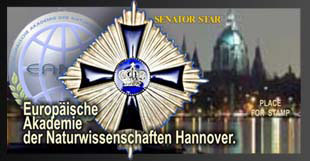 |
European Academy
|
| Home page | Энциклопедия ЕАЕН | |
Энциклопедия Европейской академии естественных наук |
||
Igor A. Sheremet
Is well-known Russian scientist in the areas of applied mathematics, computer science, large-scale systems design, artificial intelligence, mathematical economy and social psychology.
Doctor of Engineering Science (1993), Professor (1998), member of the European Academy of Natural Sciences. L.Euler Medal Awards (2010) for the fundamental results in data and knowledge bases modelling, systems analysis and information theory. Professor of the Bauman Moscow State Technical University.
Prof. Sheremet's most valuable contribution to the computer technology is theory of the augmented Post systems (APS) developed during 1979-1994 and fully described in the monography "Intelligent Software Medias for the Computerized Information Processing Systems" (Moscow, Nauka, 1994), Kapitsa (Nobel Prize Winner) Medal Awards. String-based mathematical foundations of this theory make it extremely powerful and flexible tool in the various segments of modern computer science. A new life of the APS and their various soft and hardware implementation begun inside the network-centric systems (NCS) area, where the most sophisticated class – real-time NCS with metacontrol – is easily handled.
Relatively independent area of Prof. Sheremet's work is the so-called grammatical approach in theory of coding developed by him during 1979-1987 in closed connection with the EPS maths. The mentioned approach provides the construction of codes irredundant over stochastic context-free languages. The lower bounds of this codes costs because of eliminating the subsets of unpermitted (and so uncoded) words is multiply less than the Shannon's bound estimated over the set of all words in the source alphabet. The main content of this approach is fully described in "Grammatical Codings" (Hannover, EANS, 2012).
Recent investigations performed by Prof. Sheremet concern the so-called recursive multisets (RMS) proposed by the author in the monography "Recursive Multisets and Their Applications" (Moscow, 2010, English translation – Berlin, EANS, 2011). The RMS are new mathematical apparatus which, from the one hand, generalizes the early models in the operations research area (linear programming problem, transport problem, maximal pair matching problem, optimal assignments problem, maximal flow problem, travelling salesman problem, shortest path problem), and, on the other hand, makes it easy to formalize large-scale systems (the author call them hierarchical sociotechnical) design procedures in the unified constructions (so-called multigrammars and metamultigrammars). The multicriterial optimization techniques associated with RMS allow the easiest way of the optimal hierarchical systems synthesis by the multigrammar (metamultigrammar) description of the set of systems and application the effective regular algorithmics to construct the subset of it corresponding to the conditions embedded in the noted description. The developed theory of RMS has a lot of practically useful applications in mathematical economy and systems analysis, the most interesting of which are business planning as well as budget and defense planning. These directions are intensively developed by Prof. Sheremet's scientific school.
Another interesting area of Prof. Sheremet's investigations are word equations. From the practical point of view the most valuable kind of these equations is associated with context-free (CF) languages, so concerning the key algorithm in the logical inference axiomatics of the augmented Post systems – the so-called S-unification. The last is generalization of the classical unification by Robinson. Prof. Sheremet investigated carefully various kinds of the word equations on the CF languages as well as systems of such equations. The mathematical apparatus developed permitted to obtain the fundamental result about algorithmical unsolvability of the problem of construction of the less general unifier of the set of first order predicate atoms. This theory is presented in the monography "Word Equations on the Context-Free Languages" (Hannover, EANS, 2011).
A very interesting contribution was performed by Prof. Sheremet with his disciples in the area of social psychology – namely, the so-called sociometrical approach. The analytical models developed by the authors within this approach make it extremely valuable in the cases of electoral campaigns planning, social engineering etc. These results are published in the monography "Mathematical Modelling of the Information–Psychological Relations in Sociums" (Moscow, Nauka, 2007).
Today Prof. Sheremet and his scientific school is working on the various complicated problems in the areas of robotics, vulnerability and robustness of large-scale sociotechnical systems, optimal resource planning and control in economic macrosystems etc.
| Энциклопедия ЕАЕН |
¦ Impressum ¦ Datenschutzerklärung ¦ Contact